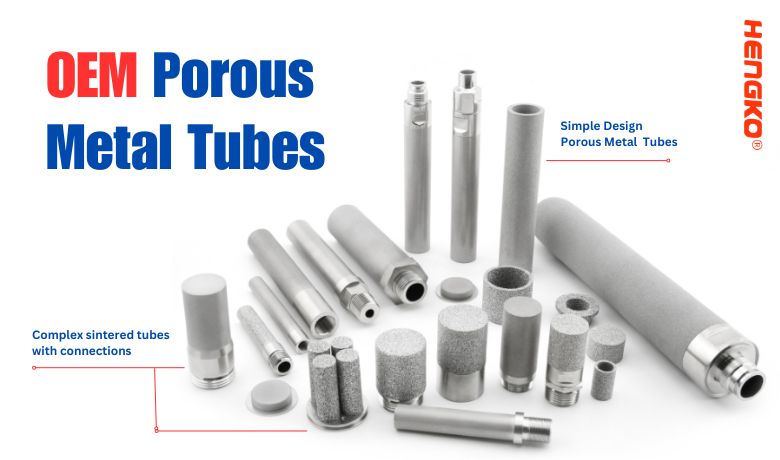-
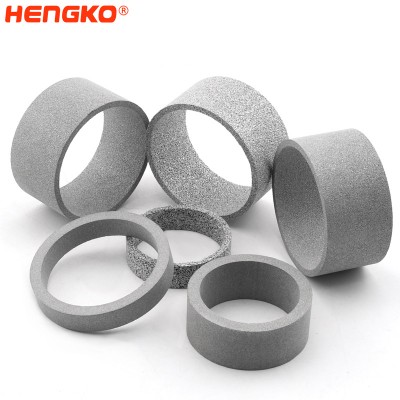
Stainless Steel Sintered Porous Metal Filter Tubes Porosity Down to 0.2 µm – In F...
Pore size:0.2-100microns Materials: SS Metal Porosity:30%~45% Working Pressure:3MPa Operating Temperature:600℃ Applications for sintered porous metal ...
View Detail -
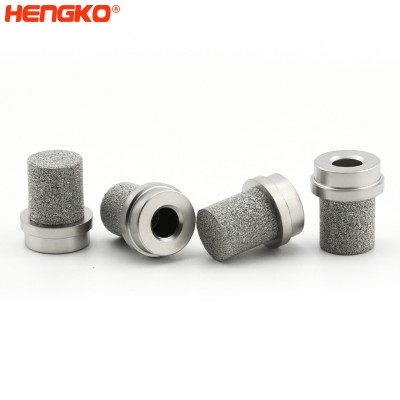
Replacement Micro-Bubble Porous Sparger Tips for Fermentation / Bioreactor Air Aeration...
Advantages of HENGKO Porous Metal Micro Spargers Due to the low solubility of oxygen in many cell culture mediums, optimizing this critical nutrient can be ...
View Detail -
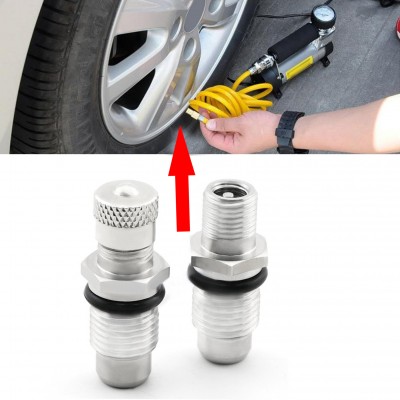
Stainless Steel Tubeless Tire Valve Sturdy And Durable Tire Valve Short Rod For Car Tru...
Products Description The valve is an independent valve body device that allows gas to enter the space of a tubeless tire or tube when it is opened, and then ...
View Detail -
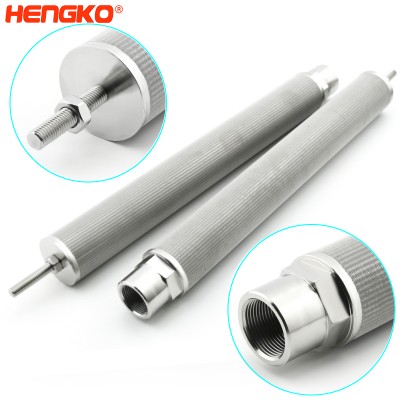
Wholesale Wire Mesh Filter Stainless Steel 10 Micron Sintered Tube For Pharmaceutical M...
Stainless steel filters are ideal for use in demanding engineering specifications that require filtration in adverse environmental conditions, such as jet en...
View Detail -
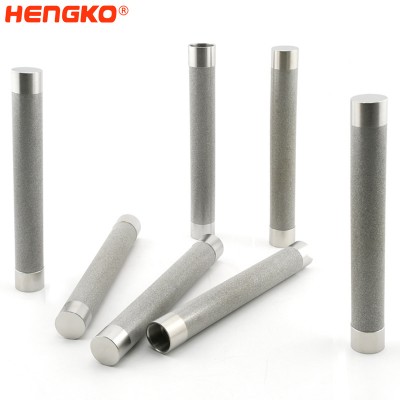
Sintered Porous Metal Stainless Steel Filter Tube for Fiber Optic Collimator HENGKO
Product Describe porous metal cartridges can be customized for a wide variety of applications and specifications and can be attached to metallic and non-meta...
View Detail -
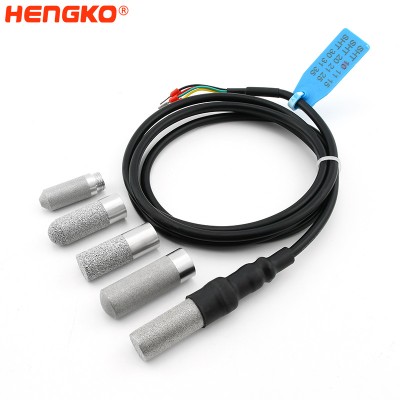
High Accuracy Low Consumption I2C Interface Temperature & Humidity relative Sensor...
HENGKO temperature and humidity sensor probe made with an IP66 protection grade high-tightness stainless steel sensor porous housing, it can be directly used...
View Detail -
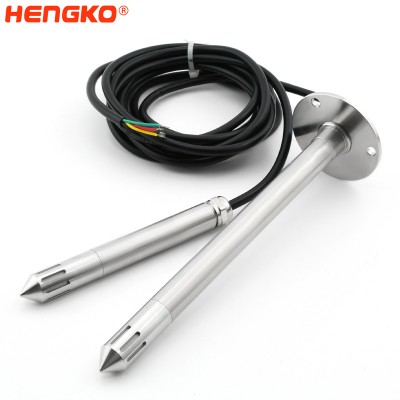
temperature and relative humidity sensor probe with stainless steel extension tube and ...
The HT-E067 relative humidity/ temperature transmitter provides a reliable and low-cost method for duct mount monitoring applications. Solid-state sensors pr...
View Detail -
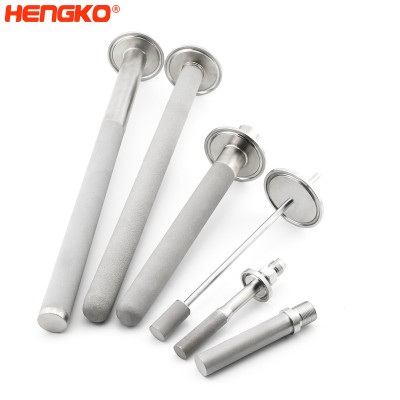
Sintered Sparger Tube with Porous Metal Stainless Steel Tank and In-line Spargers Used ...
Introducing the exceptional HENGKO sintered spargers, the ultimate solution to introducing gases into liquids. This innovative product utilizes thousands of...
View Detail -
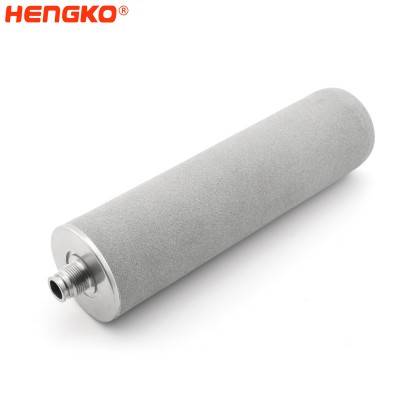
High performance porous sintered metal stainless steel isostatic filters tubes support ...
Stainless steel sintered tubes are made of stainless steel powder, processed by sintering technology. This product can purify the contaminated media and achi...
View Detail -
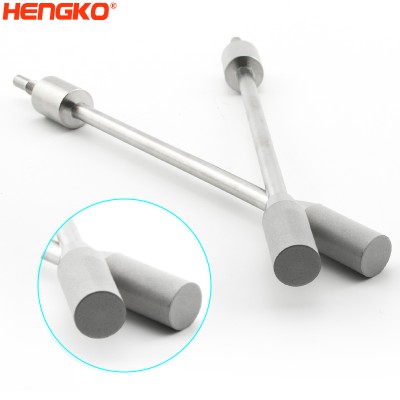
Hydrogen rich water machine – sintered SS 316L stainless steel 0.5 2 micron air o...
Hydrogen water is clean, powerful, and with hydron. It helps to purify the blood and gets blood moving. It can prevent many kinds of diseases and improve peo...
View Detail -
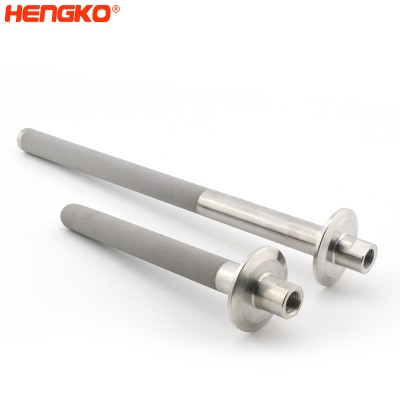
Installed Directly Porous Metal In-Line Sparger Tube Generate Small Bubbles
HENGKO sintered spargers introduce gases into liquids through thousands of tiny pores, creating bubbles far smaller and more numerous than with drilled pipe ...
View Detail -
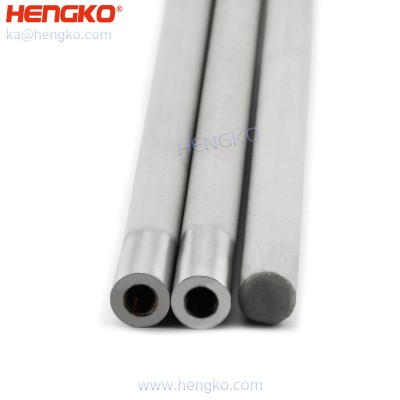
316L stainless steel porous metal straight filter tube shaped sparging assemblies
Sintered air stone diffusers are often used for porous gas injecting. They have different pore sizes(0.5um to 100um) allowing small bubbles to flow through t...
View Detail -
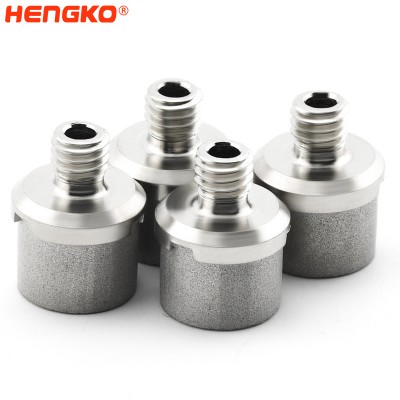
316L stainless steel porous sparger tube sintered tip for fermentation vessel accessories
Attaches to the tip of the sparger tube, this 316L stainless steel sintered tip is available in a variety of pore sizes. The 5 10 15 50 100 pore frit is the ...
View Detail -
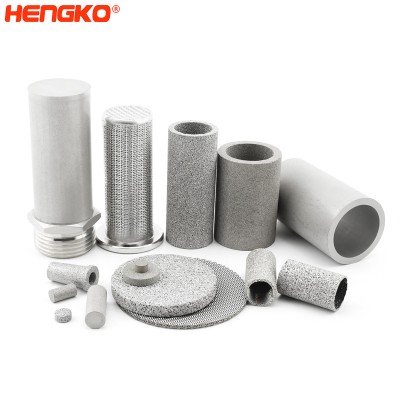
Cylindrical 25 50 micron stainless steel microns porous powder sintered filter tube for...
HENGKO stainless steel filter tubes are made by sintering 316L powder material or multilayer stainless steel wire mesh at high temperatures. They have been w...
View Detail -
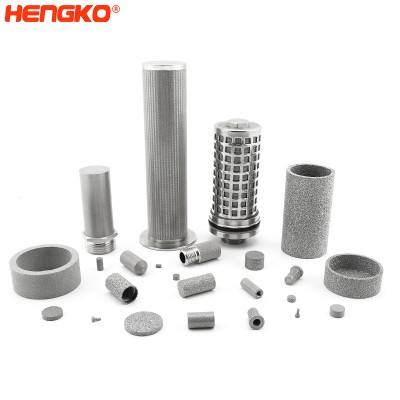
Porous metal filter tube for thermal management refining and specialty chemical | HENGKO
HENGKO stainless steel filter tubes are made by sintering 316L powder material or multilayer stainless steel wire mesh at high temperatures. They have been w...
View Detail -
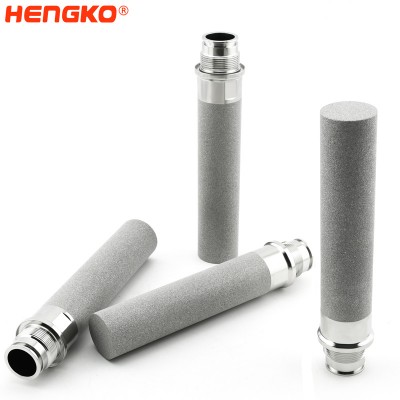
Professional manufacturer customized sintered porous metal filter tube used for medical...
HENGKO sintered filters are usually used for purification and filtration of liquid and gas, separation and recovery of solid particles, transpiration cooling...
View Detail -
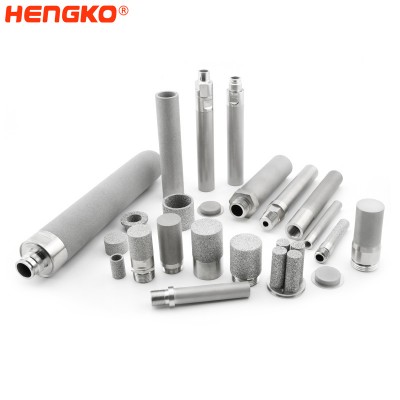
0.2um to 90 micron 5 – 100mm height powder or wire mesh porous sintered metal sta...
HENGKO stainless steel filter tubes are made by sintering 316L powder material or multilayer stainless steel wire mesh at high temperatures. They have been w...
View Detail -
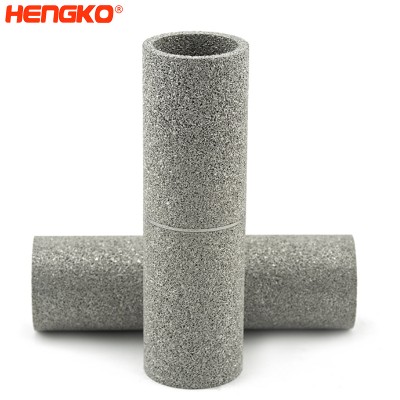
Sintered metal powder porous 316l SS stainless steel filter tube, 2 μm 5 7 10 15 20 30 ...
HENGKO stainless steel filter tubes are made by sintering 316L powder material or multilayer stainless steel wire mesh at high temperatures. They have been w...
View Detail -
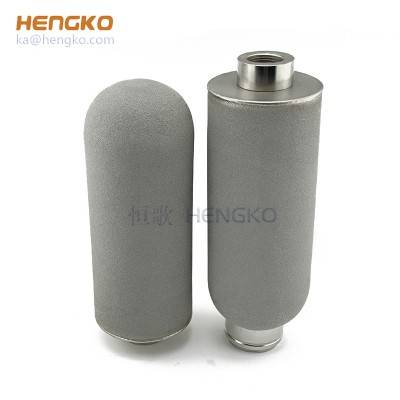
2 10 20 25 microns porous SS 304/316L metal sintered stainless steel filter tube for li...
HENGKO stainless steel filter tubes are made by sintering 316L powder material or multilayer stainless steel wire mesh at high temperatures. They have been w...
View Detail -
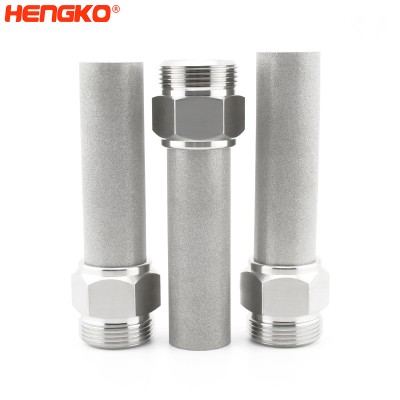
Sintered metal 316 stainless steel filter medical micro filter tube for liquid and gas ...
Product Describe Porous filter material has been widely used in metallurgical, chemical, pharmaceutical, aerospace, and aviation fields. Porous Metal media...
View Detail
Why Use Porous Metal Tube ?
There are several key reasons why sintered metal tube are used in various applications:
Filtration:
* Their primary function is filtration. The precisely controlled pore size allows them to remove impurities,
particles, and contaminants from fluids and gases. This can be crucial in industries like pharmaceutical,
chemical processing, and food and beverage, where purity is essential.
* Pore sizes can range from submicron to several millimeters, enabling them to filter out a wide range of particle sizes.
Controlled Flow:
* The porous structure allows for controlled flow of liquids and gases.
This can be used for aeration, gas distribution, fluidization, and other applications where precise control of flow is necessary.
* The uniform pore distribution ensures consistent flow throughout the tube, preventing channeling and uneven pressure distribution.
Durability and Strength:
* Made from metals like stainless steel, nickel, or bronze, porous metal tubes are highly durable and can withstand harsh operating
conditions, including high temperatures, pressures, and corrosive environments.
* This makes them suitable for long-term use in demanding industrial applications.
Other benefits:
* Porous metal tubes are also lightweight, easily cleaned, and recyclable. They can be readily machined and shaped into various forms,
further expanding their versatility.
Here are some specific examples of applications where porous metal tubes are used:
* Air diffusers: in wastewater treatment plants to introduce oxygen into the water for bacterial growth.
* Fuel filters: in automobiles and other vehicles to remove impurities from fuel.
* Medical implants: for bone ingrowth and drug delivery.
* Catalyst supports: in chemical reactors to hold and distribute catalysts.
* Silencers: in exhaust systems to reduce noise.
Ultimately, the specific reasons why someone would choose a porous metal tube depend on the specific application
and its requirements. However, their unique combination of filtration, controlled flow, durability, and other benefits
make them a valuable tool for a wide range of industries.
Main Function
The sintered metal tube is almost same function with other sintered metal filters or sintered metal sparger.
The main function of porous metal tubes is to provide efficient and reliable filtration, separation, and control
of fluid and gas flow.
These porous metal tubes are made from quality 316L SS metal particles that are fused together through a sintering
process, creating a structure with interconnected pores. The unique characteristics of porous metal tubes
enable them to serve several essential functions:
1. Filtration:
The primary purpose of porous metal tubes is to act as filters, removing impurities, particles, and contaminants from fluids and gases.
The precise control of pore size allows them to achieve fine filtration down to submicron levels, ensuring the purity of the medium being processed.
2. Gas and Liquid Dispersion:
Porous metal tubes are used to disperse gases or liquids evenly and uniformly. By controlling the pore size and distribution,
they can create a uniform flow pattern, preventing channeling and improving dispersion efficiency.
3. Fluidization:
In fluidized bed applications, these tubes are employed to fluidize solid particles, creating a suspended fluid-like state.
The uniform distribution of pores aids in achieving efficient and controlled fluidization.
4. Venting and Pressure Equalization:
Porous metal tubes are utilized for venting gases, equalizing pressure, or relieving vacuum conditions in various systems
and devices. They enable the passage of air or gas while preventing the entry of contaminants.
5. Noise Reduction:
In some applications, porous metal tubes are utilized as silencers or mufflers to reduce noise levels generated by the flow of gases or fluids.
6. Diffusion:
Porous metal tubes facilitate gas or liquid diffusion processes by allowing molecules to pass through their interconnected pores.
This property finds application in various fields, such as catalysis and mass transfer operations.
7. Support and Distribution:
In certain industries, porous metal tubes act as support structures for catalysts or other substances, providing a stable
framework and aiding in uniform distribution.
Due to their high porosity, durability, chemical resistance, and controllable pore structures, porous metal tubes find extensive
use in industries such as pharmaceuticals, petrochemicals, water treatment, automotive, aerospace, and many more,
where efficient filtration and controlled flow processes are crucial for optimal performance and safety.
Working Principle of Sintered Porous Metal Tubes
The working principle of sintered porous metal tubes is based on the unique properties of the sintered metal structure,
which allows for efficient filtration and controlled flow of fluids and gases. Here's an overview of the working principle:
1. Sintering Process:
Porous metal tubes are manufactured through a process called sintering. It involves compacting metal particles, typically
stainless steel or other metal alloys, into a specific shape, such as a tube. The metal particles are heated to a temperature
just below their melting point, causing them to fuse together, forming a solid and interconnected network of pores.
2. Pore Structure:
The sintered metal tubes have a defined pore structure due to the arrangement of metal particles during the sintering process.
The size, shape, and distribution of these pores can be precisely controlled during manufacturing to meet specific filtration requirements.
3. Filtration:
The primary function of sintered porous metal tubes is filtration. When a fluid or gas passes through the tube, contaminants,
particles, and impurities are captured within the pores. The pore size is designed to allow the desired fluid or gas to pass through
while blocking the unwanted substances.
4. Filtration Efficiency:
The filtration efficiency of sintered porous metal tubes depends on the pore size and the total surface area available for filtration.
Smaller pore sizes can capture finer particles, offering higher filtration efficiency.
5. Flow Control:
The interconnected pore structure of the sintered metal tubes enables precise control over fluid or gas flow. The size and
distribution of the pores influence the flow rate and pressure drop across the tube. This property is crucial in applications
where uniform flow distribution or controlled fluidization is required.
6. Durability and Resistance:
Sintered metal tubes are durable and resistant to mechanical stress, chemicals, and high temperatures. The sintering
process ensures that the metal particles are firmly bonded, providing structural integrity even under challenging operating conditions.
7. Reusability and Cleanability:
Sintered porous metal tubes can be easily cleaned and reused. They can withstand various cleaning methods,
such as backwashing, ultrasonic cleaning, or chemical cleaning, without compromising their filtration efficiency.
The working principle of sintered porous metal tubes makes them highly versatile and suitable for a wide range of
applications in industries such as petrochemicals, pharmaceuticals, water treatment, aerospace, and more. They are
chosen for their efficient filtration, durability, and ability to withstand harsh environments, providing reliable performance
in critical processes and systems.
What You Should Care OEM Porous Metal Tubes ?
When considering OEM special porous metal tubes for your filtration system or projects, there are several
essential factors to take into account to ensure optimal performance and a successful implementation.
Here are some key considerations:
1. Filtration Requirements:
Clearly define the specific filtration requirements for your application. Determine the desired filtration efficiency,
pore size, and flow rate needed to achieve the desired results.
2. Fluid or Gas Characteristics:
Understand the properties of the fluid or gas to be filtered, including temperature, pressure, viscosity, and chemical
compatibility. Ensure that the selected porous metal material can withstand the intended operating conditions.
3. Pore Size and Structure:
Work with the OEM manufacturer to customize the pore size and structure of the porous metal tubes to match your
application's needs. Consider the particle size of contaminants to be removed and the desired flow characteristics.
4. Material Selection:
Choose the appropriate metal material based on its chemical resistance, mechanical properties, and compatibility with
the medium being filtered. Common materials include stainless steel, bronze, nickel, and titanium.
5. Design and Geometry:
Collaborate with the OEM manufacturer to design the tube's shape and dimensions to fit your system or project.
Consider factors such as length, diameter, and end connections for easy integration.
6. Filtration Efficiency and Pressure Drop:
Balance the filtration efficiency with the pressure drop across the porous metal tubes. Higher filtration efficiency may
lead to increased pressure drop, which could affect system performance.
7. Cleanability and Maintenance:
Discuss the cleanability and maintenance requirements of the porous metal tubes. Ensure they can be easily cleaned
and reused to optimize the lifespan and reduce downtime.
8. Customization and Expertise:
Work with an experienced OEM manufacturer with a proven track record in producing specialized porous metal tubes.
They should have the expertise to customize the tubes according to your unique needs.
By carefully considering these factors and collaborating closely with the OEM manufacturer, you can ensure that the
OEM special porous metal tubes are designed and tailored to meet your filtration system or project's unique needs,
ultimately leading to improved efficiency, reliability, and performance.
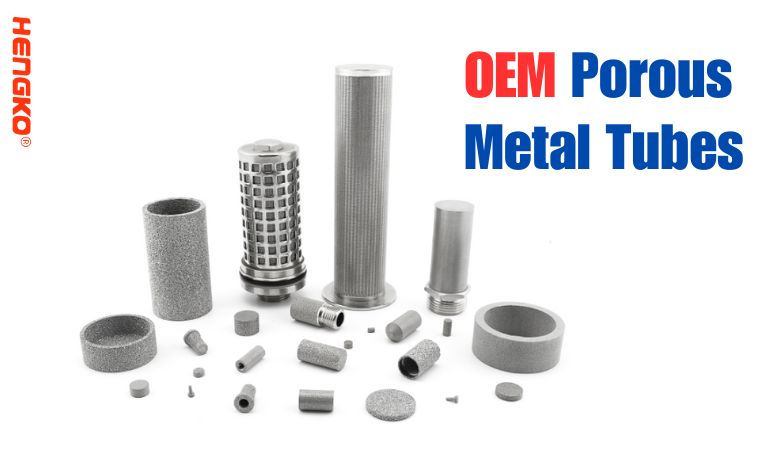
FAQ
1. What are the key features of porous sintered metal tubes?
Porous sintered metal tubes offer several key features that make them unique and highly advantageous for
various applications. These features include:
*High Filtration Efficiency:
The precise control of pore size allows for effective filtration down to submicron levels,
ensuring the removal of contaminants and impurities from fluids and gases.
*Durability and Strength:
Sintering process bonds metal particles, providing mechanical strength and resistance
to deformation, even under harsh conditions.
*Wide Temperature and Pressure Range:
The tubes can operate in extreme environments, maintaining structural integrity and filtration
efficiency across a broad range of temperatures and pressures.
*Chemical Compatibility:
They are chemically inert and resistant to corrosion, making them suitable for filtering aggressive
chemicals and corrosive media.
*Cleanability and Reusability:
Porous sintered metal tubes can be easily cleaned and reused multiple times, reducing maintenance
costs and extending the filter's lifespan.
2. How do porous sintered metal tubes function as filters?
The functioning of porous sintered metal tubes as filters is based on their interconnected pore structure.
When a fluid or gas flows through the tube, contaminants and particles are captured within the pores
while allowing the desired medium to pass through. The size, distribution, and arrangement of pores
determine the filtration efficiency and the type of particles that can be removed. The sintered metal's high
porosity and fine pores enable effective filtration, making these tubes ideal for critical applications where
precise and reliable filtration is required.
3. What are the considerations for installing porous sintered metal tubes in a system?
Proper installation is crucial to ensure the optimal performance of porous sintered metal tubes. Some considerations include:
*Proper Sealing:
Ensure secure and leak-free connections at both ends of the tube to prevent bypass and maintain filtration efficiency.
*Orientation:
Position the tube correctly to ensure the flow direction aligns with its designed function, whether it's for filtration, venting, or fluidization.
*Support and Protection:
Provide adequate support and protection to prevent damage to the tubes during installation and operation.
4. In which applications can porous sintered metal tubes be used?
Porous sintered metal tubes find applications across various industries, including:
Petrochemicals and Refining: For catalyst support, filtration of process fluids, and gas diffusion applications.
Pharmaceuticals: In sterile venting, gas filtration, and drug delivery systems.
Water Treatment: For wastewater treatment, aeration, and filtration of potable water.
Aerospace: In fuel and hydraulic systems for filtration and venting.
Automotive: In emission control, fuel filtration, and lubrication systems.
Food and Beverage: For beverage carbonation, aeration, and steam filtration.
5. How do porous sintered metal tubes contribute to system efficiency and performance?
Porous sintered metal tubes enhance system efficiency and performance by:
*Ensuring high filtration efficiency, leading to cleaner and more purified fluids or gases.
*Providing a uniform flow distribution, preventing channeling or uneven pressure distribution.
*Withstanding harsh conditions, reducing downtime and maintenance costs.
*Facilitating gas diffusion and fluidization processes, optimizing chemical reactions and mass transfer operations.
6. What quality control measures are employed during the manufacturing of porous sintered metal tubes?
HENGKO as a Top Sintered Metal Filter manufacturers implement stringent quality control measures throughout the manufacturing process. This includes:
*Material Quality: Using high-grade metal particles to ensure mechanical strength and chemical resistance.
*Pore Size Control: Precise control of sintering parameters to achieve the desired pore size and distribution.
*Dimensional Accuracy: Ensuring tight tolerances to meet customer specifications.
*Performance Testing: Conducting filtration efficiency tests, pressure drop assessments, and mechanical strength evaluations.
Don't hesitate to reach out to us for a consultation and let us help you optimize your filtration system or project.
Email us at ka@hengko.com now and take the first step towards enhanced efficiency and performance with
HENGKO's Quality Sintered metal tube.
